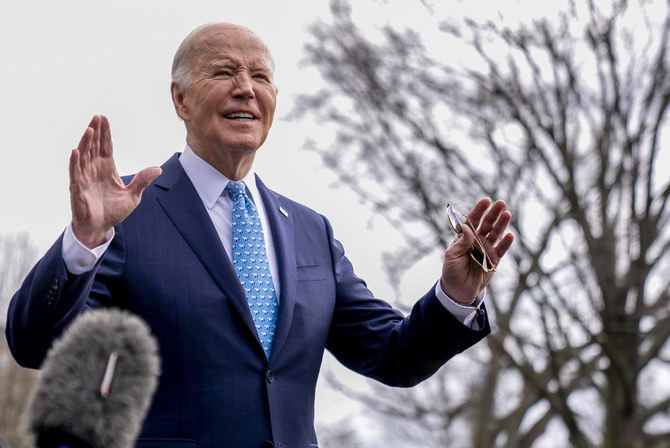
It takes a single-minded and determined person at Joe Biden’s stage of life, and after nearly 50 years in US politics in both the Senate and the White House, to even contemplate running for the country’s top job.
Competing against a rival more interested in character assassination than civilized debate was even more challenging. Moreover, had Biden lost he would have been blamed for facilitating a second Trump term, while his victory means entering the fray of salvaging the country from a devastating pandemic and deep social divisions, and disposing of the toxicity that has infected the US political system as well as the sabotage of multilateralism in foreign affairs.
Throughout his campaign Biden seemed neither fazed nor deterred by any of these tasks, and now that the American people have had their say, the Biden-Harris winning duo must embark on a course of stabilization and restore some direction and coherence to the way their country is run. But one further issue that requires an urgent salvage operation, and the determination that Biden demonstrated during the election campaign, is the need to deal with whatever hope is left of reaching a peace agreement between the Israelis and the Palestinians, based on a two-state solution.
It was a misnomer for Israeli Prime Minister Benjamin Netanyahu to describe Donald Trump as the “best friend Israel can ever have,” and good for Israel’s interests. Above all, Trump accelerated a process that is bound to lead to either a one-state solution, or Israel’s becoming an apartheid state but not one that is both Jewish and democratic. More than anything else, Netanyahu recognized Trump’s fragile ago; however, Israel’s instinctively cautious leader was pushed to an even more hawkish position than he had intended in relation to the Palestinians because of the tailwind coming from the White House.
Now Biden is left to rectify, or at least mitigate, damaging acts by the Trump administration that have severely wounded relations between Israel and the Palestinians. Trump’s decisions to move the US embassy to Jerusalem, to cut all funds to the UN agency that provides humanitarian assistance and protection to 5.6 million Palestinian refugees and to the Palestinian Authority, and to close the offices of the Palestinian delegation, made the idea of the US as an honest peace broker laughable.
For the past four years, every single act by the US has prejudiced future peace negotiations on some of the core issues of contention between Israel and the Palestinians, including an agreement on parts of East Jerusalem becoming the capital of a Palestinian state, and a settlement of the refugees issue.
Yossi Mekelberg
Can President Biden fix it? Yes, he can … well, maybe. To begin with, there is no guarantee that Israeli–Palestinian relations will be a high priority for the incoming administration. Being expected to serve only one term could free Biden to initiate a peace plan without having to worry about how it will affect his chances of winning a second term. On the other hand, in light of the slim chances of achieving a peace agreement, and the myriad urgent and critical issues the newly elected president has to address, he might opt to invest his energy and credibility on those issues, particularly the coronavirus pandemic.
Biden was vice-president when the Obama administration embarked on the futile Kerry peace initiative, which failed not only because of intransigence on both sides, but also because Washington was reluctant to mobilize its power and lean on the two antagonists, especially Israel, to reach an agreement. The conditions back in 2013-14, when the initiative was presented, were far more favorable than they are now. Why should a new US president, faced with momentous challenges at home and abroad, invest in a project that has defeated every previous one?
Nevertheless, avoiding a fully fledged peace initiative doesn’t mean that a Biden administration can’t restore some trust with the Palestinians in a way that won’t be too taxing on US relations with Israel and its supporters in the US. Small steps, though significant ones, could also restore some constructive dialogue between Israel and the Palestinians, especially now that the threat of annexation of the occupied territories has lessened, thanks mainly to the normalization agreement with the UAE. A first positive move would be to reopen the Palestinian mission in Washington, the closure of which was unnecessary and unwise. Furthermore, in another act of undiplomatic folly, Trump shut down the US Consulate-General in East Jerusalem that for all means and purposes functioned as an embassy to the Palestinian state in the making. Opening even a symbolic diplomatic presence in East Jerusalem would signal a departure from Trump’s attempts to marginalize the Palestinians and pressure them into submitting to US and mainly Israel’s demands and intentions to perpetuate the occupation.
For the past four years, every single act by the US has prejudiced future peace negotiations on some of the core issues of contention between Israel and the Palestinians, including an agreement on parts of East Jerusalem becoming the capital of a Palestinian state, and a settlement of the refugees issue. No US administration would dare reverse the move of its embassy to Jerusalem, and in any case the damage has already been done, but it could be presented, at least implicitly, as only a first step, and one that should be supplemented by establishing a second US embassy in Jerusalem when an independent Palestinian state is eventually recognised.
Another crucial issue in the process of restoring trust between Washington and Ramallah is bound to involve renewing financial support to the Palestinian refugees and the Palestinian Authority, and America’s proactive involvement in ensuring on-going international financial aid, for as long as Palestinians at home and those living in enforced exile cannot materialise their right of self-determination.
A Biden administration is not going to dramatically transform US–Israel relations, and the strategic and historical alliance between the two countries will remain. Nevertheless, a Biden administration should also send clear signals to Israel that it will view with grave concern any expansion of its settlements and any unwillingness to ease the occupation of the West Bank and the blockade of Gaza, signals that will be first steps toward changing the conflict discourse and creating more conducive conditions for peace negotiations. In doing so, Biden’s administration would be seen not only as more even-handed, but also as a true friend and ally to both Israelis and Palestinians.
Yossi Mekelberg is professor of international relations at Regent’s University London, where he is head of the International Relations and Social Sciences Program. He is also an associate fellow of the MENA Program at Chatham House. He is a regular contributor to the international written and electronic media. Twitter: @YMekelberg
Disclaimer: Views expressed by writers in this section are their own and do not necessarily reflect Arab News" point-of-view












